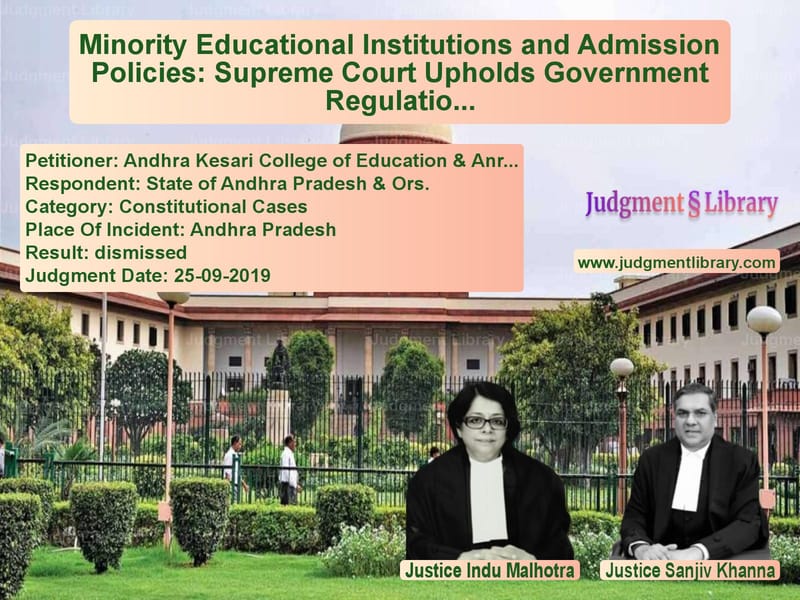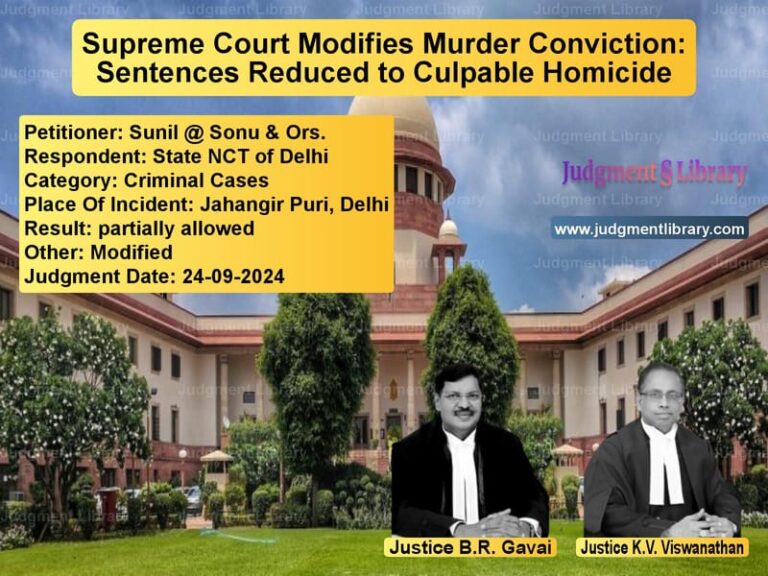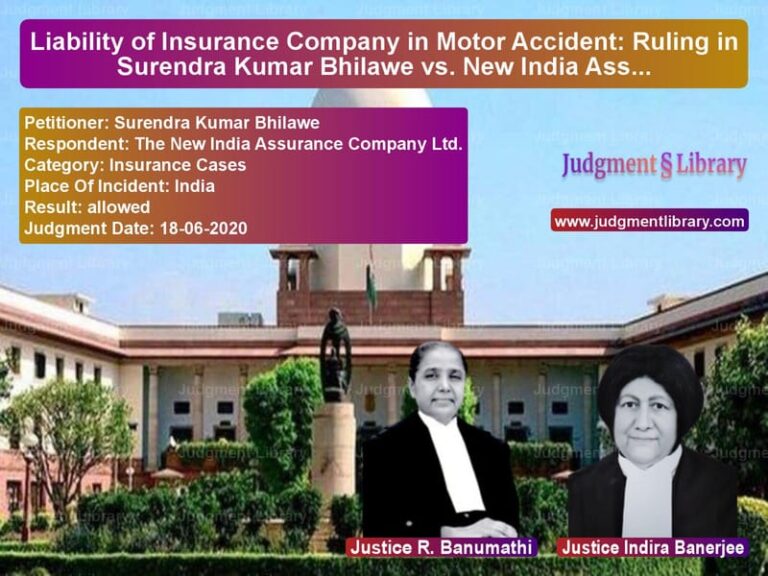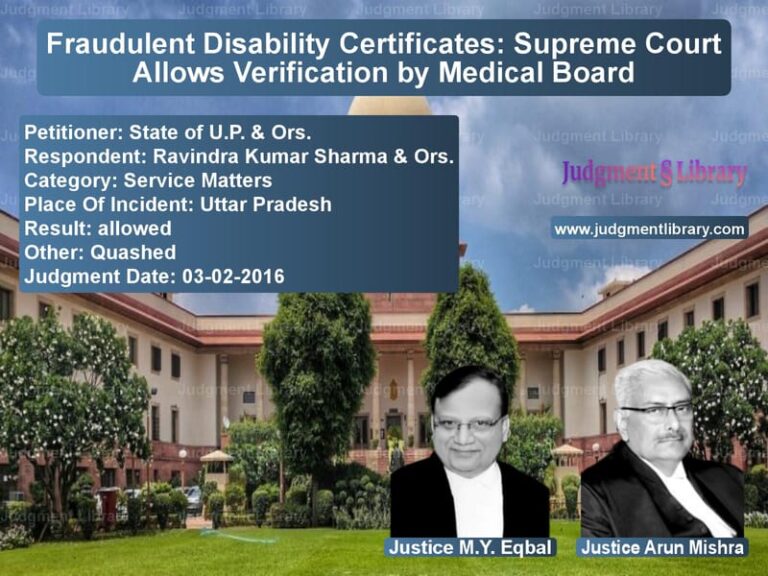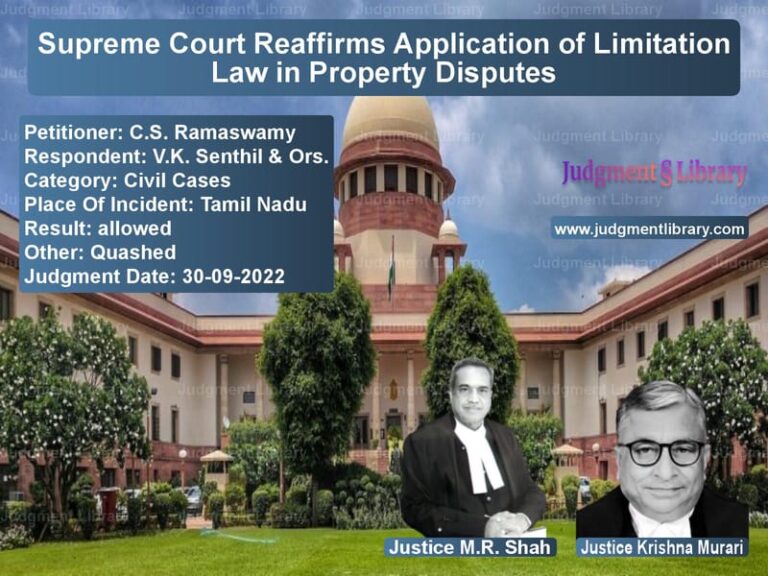Minority Educational Institutions and Admission Policies: Supreme Court Upholds Government Regulations
The case of Andhra Kesari College of Education & Anr. v. State of Andhra Pradesh & Ors. revolved around the validity of certain Government Orders (G.O.Ms) issued by the Andhra Pradesh Government regarding the admission of students to B.Ed. courses in minority educational institutions. The Supreme Court had to determine whether these government regulations violated the fundamental rights of minority institutions under Article 30(1) of the Indian Constitution.
The Court ultimately upheld the Government Orders, ruling that they did not infringe on the rights of minority institutions but rather ensured fairness and transparency in admissions. The judgment provides clarity on the regulation of minority educational institutions and the scope of government intervention in admission policies.
Background and Key Issues
The dispute arose when the Andhra Pradesh Government issued three Government Orders:
- G.O.M. No. 57 (March 21, 2005): Established criteria for determining the minority status of candidates seeking admission under the management quota in minority institutions.
- G.O.M. No. 92 (November 16, 2006): Introduced centralized counseling as the only mode for admission and directed that minority status be determined based on school certificates.
- G.O.M. No. 98 (December 6, 2006): Mandated that unfilled management quota seats in minority institutions be allotted to non-minority candidates through centralized counseling.
The key legal issues before the Supreme Court were:
- Did the Government Orders violate the rights of minority institutions under Article 30(1) of the Constitution?
- Was the requirement for centralized counseling and the filling of unfilled minority quota seats justified?
- Did the Government Orders amount to excessive interference in the administration of minority institutions?
Arguments of the Petitioners (Minority Educational Institutions)
- The requirement that minority status be determined solely based on school certificates was arbitrary and unfair.
- G.O.M. No. 98, which required unfilled management quota seats to be allocated to non-minority students through centralized counseling, was an intrusion into the rights of minority institutions.
- The centralized counseling requirement took away the autonomy of minority institutions in selecting students.
- The Government Orders violated the fundamental right to establish and administer minority institutions under Article 30(1) of the Constitution.
Arguments of the Respondents (State of Andhra Pradesh)
- The requirement for school certificates was introduced to prevent fraudulent claims of minority status based on overnight religious conversions.
- The regulations did not interfere with the right of minority institutions to admit students but ensured transparency in the admission process.
- The mandate to fill unfilled minority quota seats with non-minority candidates was in the interest of educational excellence and to prevent wastage of seats.
- The Government Orders were aimed at curbing misuse of minority quotas and ensuring that genuine minority students benefitted.
Supreme Court’s Key Observations
1. Regulations Are in the Interest of Transparency
“The Government Orders were introduced to ensure that only genuine minority students benefited from the management quota and to prevent misuse through fraudulent conversions.”
The Court found that the regulations were justified in the interest of fairness and did not violate the rights of minority institutions.
2. Centralized Counseling Does Not Violate Article 30(1)
“The requirement for centralized counseling does not take away the right of minority institutions to admit students. It only ensures that the process is fair and transparent.”
The Court held that centralized counseling was a reasonable regulation to maintain merit and efficiency in admissions.
3. Unfilled Minority Quota Seats Can Be Given to Non-Minority Students
“The mandate to fill unfilled minority quota seats with non-minority students is aimed at promoting excellence in education and ensuring that available seats are not wasted.”
The Court ruled that such a policy was in the interest of educational institutions and did not interfere with the autonomy of minority institutions.
Final Judgment
The Supreme Court dismissed the appeals and ruled that:
- The Government Orders were constitutionally valid.
- Minority institutions must comply with the regulations on admission policies.
- Unfilled management quota seats in minority institutions could be allotted to non-minority students through centralized counseling.
- The requirement for school certificates to establish minority status was justified.
Impact of the Judgment
- Strengthens Transparency in Minority Admissions: Ensures that minority quotas are not misused through fraudulent conversions.
- Clarifies the Scope of Article 30(1): Establishes that reasonable regulations in the interest of education quality do not violate minority rights.
- Prevents Seat Wastage: Allows unfilled minority quota seats to be utilized efficiently.
- Supports Government Oversight: Upholds the state’s role in ensuring fair admission practices in minority institutions.
The Supreme Court’s decision ensures that minority educational institutions operate in a fair and transparent manner while still maintaining their autonomy under Article 30(1).
Petitioner Name: Andhra Kesari College of Education & Anr..Respondent Name: State of Andhra Pradesh & Ors..Judgment By: Justice Indu Malhotra, Justice Sanjiv Khanna.Place Of Incident: Andhra Pradesh.Judgment Date: 25-09-2019.
Don’t miss out on the full details! Download the complete judgment in PDF format below and gain valuable insights instantly!
Download Judgment: Andhra Kesari Colleg vs State of Andhra Prad Supreme Court of India Judgment Dated 25-09-2019.pdf
Direct Downlaod Judgment: Direct downlaod this Judgment
See all petitions in Education Related Cases
See all petitions in Fundamental Rights
See all petitions in Judgment by Indu Malhotra
See all petitions in Judgment by Sanjiv Khanna
See all petitions in dismissed
See all petitions in supreme court of India judgments September 2019
See all petitions in 2019 judgments
See all posts in Constitutional Cases Category
See all allowed petitions in Constitutional Cases Category
See all Dismissed petitions in Constitutional Cases Category
See all partially allowed petitions in Constitutional Cases Category

